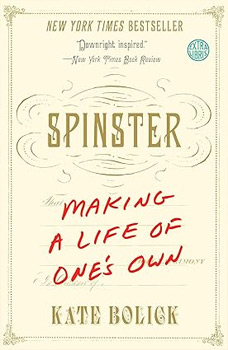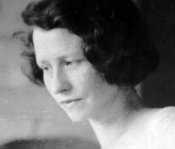Summary | Excerpt | Reading Guide | Discuss | Reviews | Beyond the Book | Read-Alikes | Genres & Themes | Author Bio

Making a Life of One's Own
by Kate BolickThis article relates to Spinster
 In Spinster, Kate Bolick leans on the examples of women who have come before her, as a source of solace and encouragement for her own life choice to remain single. She found herself looking to the examples of five "awakeners," all talented women whose creativity and professional success were independent of their marital status.
In Spinster, Kate Bolick leans on the examples of women who have come before her, as a source of solace and encouragement for her own life choice to remain single. She found herself looking to the examples of five "awakeners," all talented women whose creativity and professional success were independent of their marital status.
One of these five "awakeners" is the poet Edna St. Vincent Millay, a writer who was famous in her lifetime (1892-1950), perhaps almost as much for her sexual freedom and openness about sexuality as she was for her acclaimed sonnets. Millay was born in Maine, raised by a single mother, and attended Vassar College after winning a scholarship for her poem "Renascence." While at Vassar, she became romantically involved with several women and wrote a play about love between women.
After graduating from college, Millay moved to Greenwich Village in New York City and associated with many other bohemian writers and artists. Openly bisexual and widely admired for her charismatic readings and recitations, Millay spurned proposals of marriage and wrote frankly not only about sexuality but also more broadly about new types of nonconformist experiences and possibilities for women. Her biographer, Nancy Milford, wrote that Millay "became the herald of the New Woman."
At the age of 31, in 1923, Millay did marry the widower Eugen Jan Boissevain, who devoted himself to her career. In the same year, Millay won the Pulitzer Prize for poetry, for The Ballad of the Harp-Weaver. Millay and her husband had an open relationship, and she continued to have affairs with men and women during their long marriage.
Millay's poetry was traditional in form and style although at times it addressed many socially and politically progressive ideas and themes; when Modernism came to the forefront in the mid-twentieth century, Millay's poetry fell out of fashion for a time, only to be rediscovered and reclaimed by the feminist movement of the later twentieth century, whose members — much like Kate Bolick — saw in Millay a kindred spirit, one who had given voice to women's potential decades earlier.
Picture of Edna St. Vincent Millay from Poetry Foundation
Filed under Books and Authors
![]() This "beyond the book article" relates to Spinster. It originally ran in April 2015 and has been updated for the
April 2016 paperback edition.
Go to magazine.
This "beyond the book article" relates to Spinster. It originally ran in April 2015 and has been updated for the
April 2016 paperback edition.
Go to magazine.
Your guide toexceptional books
BookBrowse seeks out and recommends the best in contemporary fiction and nonfiction—books that not only engage and entertain but also deepen our understanding of ourselves and the world around us.